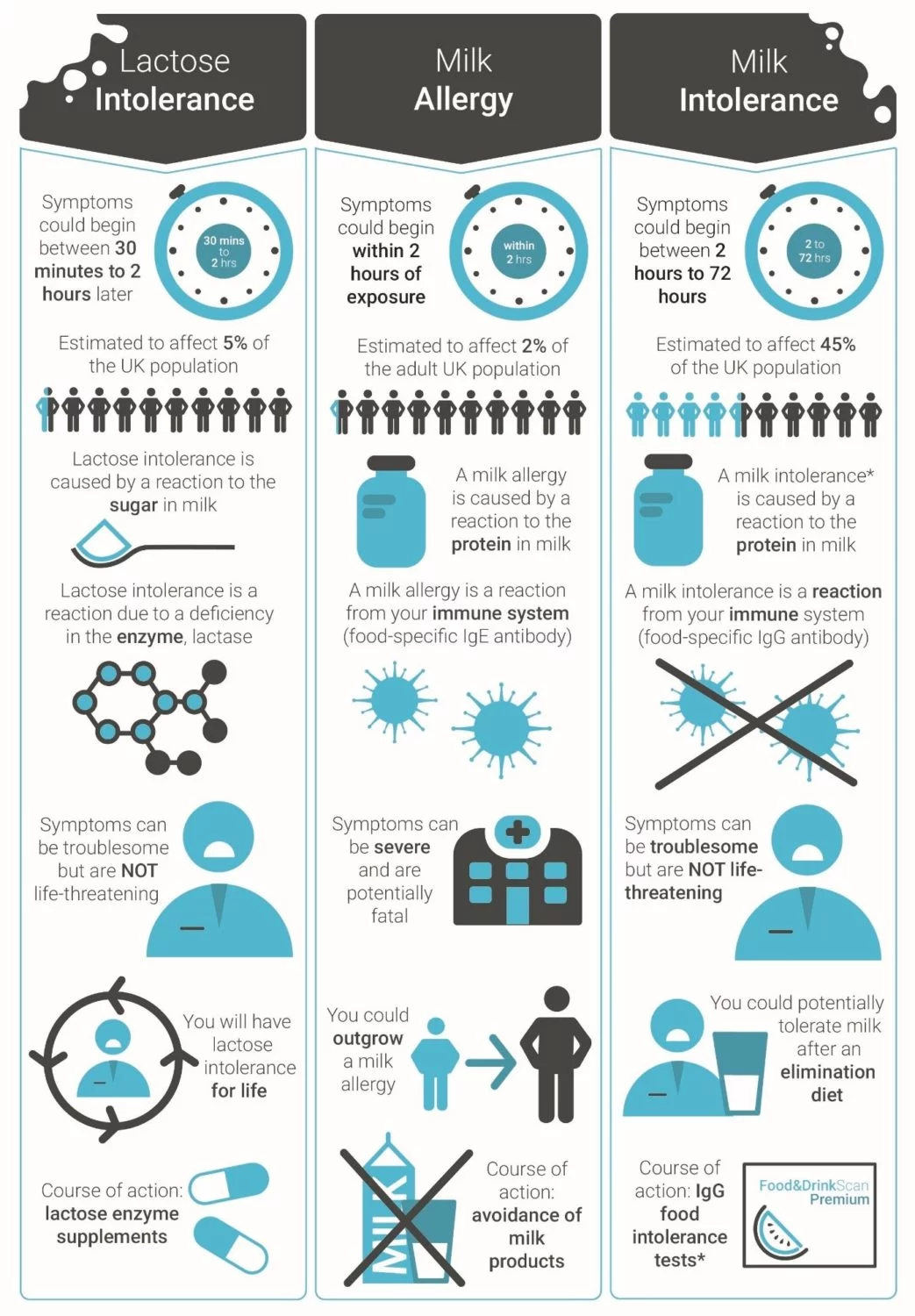
Lactose-free milk is still made from cows milk so it is not the same as dairy-free milk. About 65 percent of people after all are intolerant to lactose.

About 65 percent of people after all are intolerant to lactose.
Allergic to lactose free milk. Lactose intolerance happens when your body cant break down the sugar found in milk properly. This causes mainly gut symptoms such as diarrhoea bloating and cramps. It is actually extremely rare for a baby to be born with a lactose intolerance although some may develop it after a vomiting or diarrhoeal illness.
A food allergy can be potentially life-threatening. Unlike food allergies food intolerances do not involve the immune system. People who are lactose intolerant are missing the enzyme lactase.
Lactase breaks down lactose a sugar found in milk and dairy products. As a result people with lactose intolerance are unable to digest these foods. They may experience symptoms such as nausea cramps gas bloating and diarrhea.
Check with your doctor and request lactose-free tablets. Cows milk allergy is very different to lactose intolerance. An allergic reaction is when the bodys immune system launches an inappropriate response to substances mistakenly perceived as a threat.
Common triggers include latex detergent dust pollen or certain proteins in food. In cows milk it is the protein casein that causes. Lactose intolerance is caused by not having enough of the enzyme lactase which is needed to break down lactose the sugar found in milk.
Someone with a milk allergy and someone who is lactose intolerant will need to seek different alternatives to traditional milk. People with lactose intolerance can opt for lactose-free milk brands like Lactaid. As explained on the products website Lactaid is formulated for people with lactose intolerance as the lactose in Lactaid is already broken down into the more easily digested sugars.
Lactose-free milk is still made from cows milk so it is not the same as dairy-free milk. People with a dairy allergy should avoid any type of dairy including those labeled lactose-free Theres a wide array of dairy-free alternatives on the market these days. Plant-based milk is typically made from vegetables grains or legumes.
About 65 percent of people after all are intolerant to lactose. According to Neeta Ogden MD an adult and pediatric allergist asthma specialist and immunologist in New Jersey an allergy. However lactose intolerants can consume lactose-free dairy products.
There are some similarities between milk allergy and lactose intolerance symptoms. However in the case of allergy they can be fatal depending on the patients sensitivity levels. Again lactose-free milk is not appropriate for infants children or adults who are allergic or sensitive to the proteins in milk.
It also isnt suitable for most people who forsake dairy for general health and disease prevention religious andor political reasons. It is still a heavily dairy-based product. People who cant tolerate dairy usually have problems with either the protein or carbs in milk.
Those with a milk allergy have an allergic reaction to the protein while those who are lactose. Lactose intolerance is so common you can buy lactose-free milk in your regular grocery store. Lactose-free products are treated with the enzyme lactase that breaks the lactose down before you ingest it.
Its this lactase enzyme that is lacking in most people who are lactose intolerant. For babies or toddlers who are lactose intolerant they require something other than cows milk to drink to not have adverse reactions to their beverage. This is because children who are lactose intolerant lack an enzyme that helps them digest the lactose in cows milk which makes consuming dairy products a digestively painful experience.
If you have a dairy allergy lactose intolerance IBS SIBO gluten intolerance or intestinal permeability there is evidence that dairy can promote an inflammatory response when consumed. Additionally research supports that there is a positive link between milk consumption and the occurrence of acne and potentially eczema. Lactose intolerance is a common digestive problem where the body is unable to digest lactose a type of sugar mainly found in milk and dairy products.
Symptoms of lactose intolerance. Symptoms of lactose intolerance usually develop within a few hours of consuming food or drink that contains lactose. Lactose-free dairy products There are a number of lactose-free dairy products available to buy that are suitable for people with lactose intolerance.
These contain the same vitamins and minerals as standard dairy products but they also have an added enzyme called lactase which helps digest any lactose so the products do not trigger any symptoms.